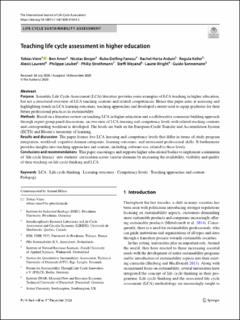Please use this identifier to cite or link to this item:
https://doi.org/10.21256/zhaw-21152Full metadata record
| DC Field | Value | Language |
|---|---|---|
| dc.contributor.author | Viere, Tobias | - |
| dc.contributor.author | Amor, Ben | - |
| dc.contributor.author | Berger, Nicolas | - |
| dc.contributor.author | Fanous, Ruba Dolfing | - |
| dc.contributor.author | Arduin, Rachel Horta | - |
| dc.contributor.author | Keller, Regula | - |
| dc.contributor.author | Laurent, Alexis | - |
| dc.contributor.author | Loubet, Philippe | - |
| dc.contributor.author | Strothmann, Philip | - |
| dc.contributor.author | Weyand, Steffi | - |
| dc.contributor.author | Wright, Laurie | - |
| dc.contributor.author | Sonnemann, Guido | - |
| dc.date.accessioned | 2021-01-06T15:50:59Z | - |
| dc.date.available | 2021-01-06T15:50:59Z | - |
| dc.date.issued | 2020-12-17 | - |
| dc.identifier.issn | 0948-3349 | de_CH |
| dc.identifier.issn | 1614-7502 | de_CH |
| dc.identifier.uri | https://digitalcollection.zhaw.ch/handle/11475/21152 | - |
| dc.description.abstract | Purpose: Scientific Life Cycle Assessment (LCA) literature provides some examples of LCA teaching in higher education, but not a structured overview of LCA teaching contents and related competencies. Hence this paper aims at assessing and highlighting trends in LCA learning outcomes, teaching approaches and developed content used to equip graduates for their future professional practices in sustainability. Methods: Based on a literature review on teaching LCA in higher education and a collaborative consensus building approach through expert group panel discussions, an overview of LCA learning and competency levels with related teaching contents and corresponding workload is developed. The levels are built on the European Credit Transfer and Accumulation System (ECTS) and Bloom’s taxonomy of learning. Results and discussion: The paper frames five LCA learning and competency levels that differ in terms of study program integration, workload, cognitive domain categories, learning outcomes, and envisioned professional skills. It furthermore provides insights into teaching approaches and content, including software use, related to these levels. Conclusions and recommendations: This paper encourages and supports higher educational bodies to implement a minimum of ‘life cycle literacy’ into students’ curriculum across various domains by increasing the availability, visibility and quality of their teaching on life cycle thinking and LCA. | de_CH |
| dc.language.iso | en | de_CH |
| dc.publisher | Springer | de_CH |
| dc.relation.ispartof | The International Journal of Life Cycle Assessment | de_CH |
| dc.rights | http://creativecommons.org/licenses/by/4.0/ | de_CH |
| dc.subject | Competency level | de_CH |
| dc.subject | LCA | de_CH |
| dc.subject | Learning outcome | de_CH |
| dc.subject | Life cycle thinking | de_CH |
| dc.subject | Pedagogy | de_CH |
| dc.subject | Teaching approach and content | de_CH |
| dc.subject | Life cycle assessment | de_CH |
| dc.subject.ddc | 333.7: Landflächen, Naturerholungsgebiete | de_CH |
| dc.subject.ddc | 378: Hochschulbildung | de_CH |
| dc.title | Teaching life cycle assessment in higher education | de_CH |
| dc.type | Beitrag in wissenschaftlicher Zeitschrift | de_CH |
| dcterms.type | Text | de_CH |
| zhaw.departement | Life Sciences und Facility Management | de_CH |
| zhaw.organisationalunit | Institut für Umwelt und Natürliche Ressourcen (IUNR) | de_CH |
| dc.identifier.doi | 10.1007/s11367-020-01844-3 | de_CH |
| dc.identifier.doi | 10.21256/zhaw-21152 | - |
| dc.identifier.pmid | 33349738 | de_CH |
| zhaw.funding.eu | No | de_CH |
| zhaw.issue | 3 | de_CH |
| zhaw.originated.zhaw | Yes | de_CH |
| zhaw.pages.end | 527 | de_CH |
| zhaw.pages.start | 511 | de_CH |
| zhaw.publication.status | publishedVersion | de_CH |
| zhaw.volume | 26 | de_CH |
| zhaw.publication.review | Peer review (Publikation) | de_CH |
| zhaw.webfeed | Ökobilanzierung | de_CH |
| zhaw.author.additional | No | de_CH |
| zhaw.display.portrait | Yes | de_CH |
| Appears in collections: | Publikationen Life Sciences und Facility Management | |
Files in This Item:
| File | Description | Size | Format | |
|---|---|---|---|---|
| 2020_Viere_etal_Teaching-life-cycle-assessment.pdf | 1.03 MB | Adobe PDF |  View/Open |
Show simple item record
Viere, T., Amor, B., Berger, N., Fanous, R. D., Arduin, R. H., Keller, R., Laurent, A., Loubet, P., Strothmann, P., Weyand, S., Wright, L., & Sonnemann, G. (2020). Teaching life cycle assessment in higher education. The International Journal of Life Cycle Assessment, 26(3), 511–527. https://doi.org/10.1007/s11367-020-01844-3
Viere, T. et al. (2020) ‘Teaching life cycle assessment in higher education’, The International Journal of Life Cycle Assessment, 26(3), pp. 511–527. Available at: https://doi.org/10.1007/s11367-020-01844-3.
T. Viere et al., “Teaching life cycle assessment in higher education,” The International Journal of Life Cycle Assessment, vol. 26, no. 3, pp. 511–527, Dec. 2020, doi: 10.1007/s11367-020-01844-3.
VIERE, Tobias, Ben AMOR, Nicolas BERGER, Ruba Dolfing FANOUS, Rachel Horta ARDUIN, Regula KELLER, Alexis LAURENT, Philippe LOUBET, Philip STROTHMANN, Steffi WEYAND, Laurie WRIGHT und Guido SONNEMANN, 2020. Teaching life cycle assessment in higher education. The International Journal of Life Cycle Assessment. 17 Dezember 2020. Bd. 26, Nr. 3, S. 511–527. DOI 10.1007/s11367-020-01844-3
Viere, Tobias, Ben Amor, Nicolas Berger, Ruba Dolfing Fanous, Rachel Horta Arduin, Regula Keller, Alexis Laurent, et al. 2020. “Teaching Life Cycle Assessment in Higher Education.” The International Journal of Life Cycle Assessment 26 (3): 511–27. https://doi.org/10.1007/s11367-020-01844-3.
Viere, Tobias, et al. “Teaching Life Cycle Assessment in Higher Education.” The International Journal of Life Cycle Assessment, vol. 26, no. 3, Dec. 2020, pp. 511–27, https://doi.org/10.1007/s11367-020-01844-3.
Items in DSpace are protected by copyright, with all rights reserved, unless otherwise indicated.